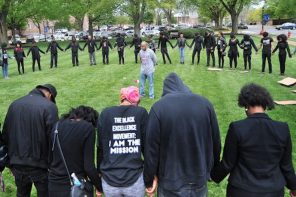Dan Gilgoff has a frank and rather revealing post up at his God & Country blog, responding to a piece I wrote on talk about abortion and health-care reform the other day. In answer to my question about why he didn’t bother to include the views of any religious pro-choice advocates, Dan says:
The hard-core religious left hasn’t shown the kind of influence, in Washington or out in the country, demonstrated by the more moderate religious progressives who provoked my piece on abortion in healthcare. I know where to find proud religious leftists, as Schultz says. But that doesn’t mean they deserve ink.
Dan may want to check his definition of “moderates”: the last I checked, a majority of Americans believed that abortion should be legal in all or most cases, and super-majorities believed that it should be available in at least some circumstances. By contrast, Catholics United and Catholics in Alliance for the Common Good hew to the Catholic hierarchy’s positions on abortion and contraception, putting them at distinct odds with public sentiment on those issues. They’re entitled to their opinions, of course, but reporters like Gilgoff should ask questions about how representative they are of the movement as a whole.
Along the same lines, Sarah Posner noted last week in response to Dan’s original post that there are in fact religious progressive organizations on the other side of the equation:
Gilgoff portrays Catholics United, a relative newcomer launched in 2004, as “an influential progressive group” that opposes coverage for abortion services in a public option. But he ignores the fact that Catholics for Choice, which has been around since the 1970s, not only supports abortion coverage but advocates for full coverage of contraception as well. Or that the Religious Coalition for Reproductive Choice is fighting not against abortion coverage but for it. These groups—whose positions are more in line with Obama’s secular base—are apparently not even worth mentioning.
And what of the denominations pushing for health-care reform, among many other groups? It’s true that the UCC is hardly a drop in the bucket, but they’re nothing to sneeze at either. Yet they have nothing to say on the subject of abortion in reform legislation.
Now, it’s true that these groups have made less of a splash than the ones Gilgoff cites. But a curious reporter might want to ask why that is. Surely there’s a story in there somewhere about how some groups came to be seen as the voice of the Religious Left while others are ignored. Or perhaps one about whether inside-the-Beltway operations truly represent the grassroots on contentious issues such as abortion?
But apparently not. According to Gilgoff, what matters is your pull with the administration. Everything else is just a waste of ink.


